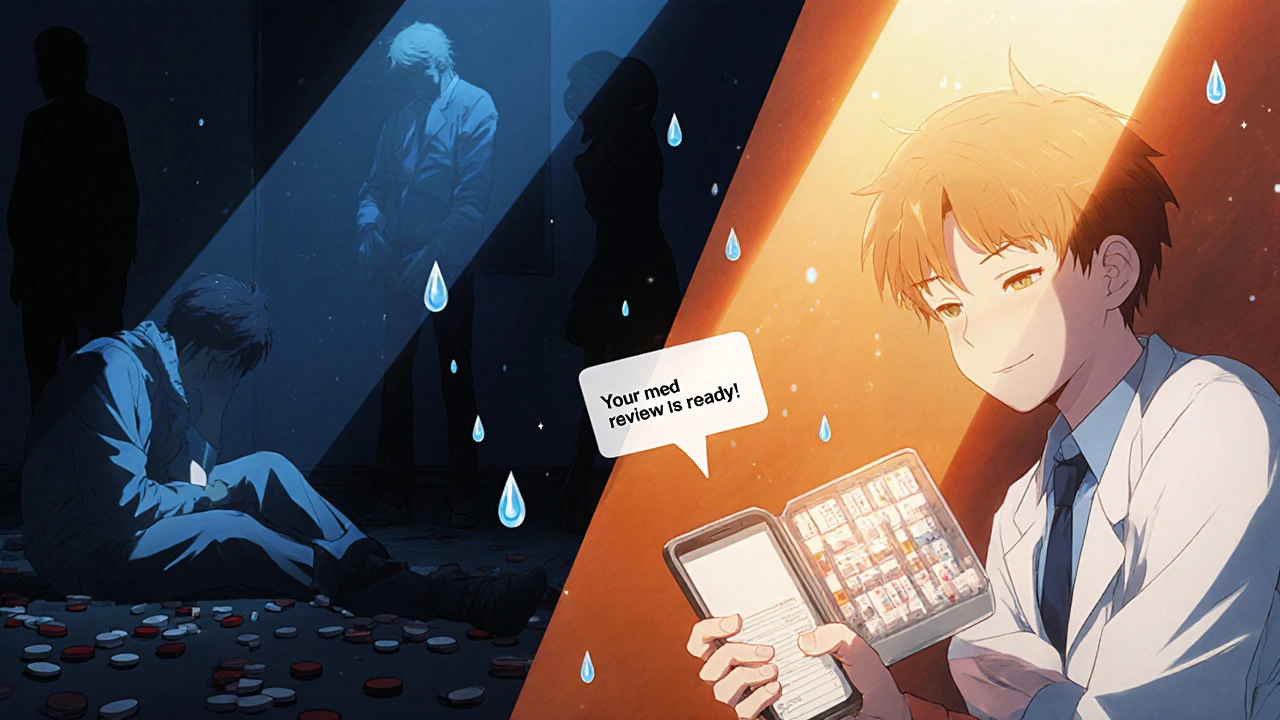Let’s be honest: if your medication makes you feel worse, you’re going to stop taking it. Not because you’re careless. Not because you don’t care about your health. But because your body is reacting - and your brain is screaming, “This isn’t helping, it’s hurting.” That’s the real barrier to medication adherence, and it’s more common than you think.
Why You Stop Taking Your Pills - Even When You Know You Shouldn’t
| Medication Type | Most Common Side Effect | Percentage of Patients Who Discontinue Due to This |
|---|---|---|
| Antidepressants | Nausea, fatigue, sexual dysfunction | 45% |
| Statins (cholesterol) | Muscle pain, weakness | 38% |
| Diabetes meds (e.g., metformin) | Diarrhea, bloating | 32% |
| Blood pressure pills | Dizziness, dry cough | 29% |
| Thyroid meds | Heart palpitations, weight changes | 25% |
According to data from the Medication Adherence is the voluntary cooperation of the patient in taking drugs or medicine as prescribed, including timing, dosage, and frequency, nearly half of all patients with chronic conditions don’t take their meds as directed. And side effects are the #1 reason why. It’s not laziness. It’s survival instinct.
Think about it: you’re told to take a pill every day for the rest of your life to prevent a heart attack or stroke. But the pill gives you nausea every morning. You feel sluggish. Your sex life drops. You start wondering - is this worth it? The answer for many is no. And that’s not irrational. It’s human.
Worse, the problem gets worse over time. The first time you feel sick after taking a pill, you might brush it off. The second time, you skip a dose. The third time, you don’t refill. By month three, you’re off the medication entirely - even though your doctor still thinks you’re taking it. This is called non-persistence, and it’s the silent killer of treatment success.
What Happens When You Stop Taking Your Meds
Stopping your medication because of side effects doesn’t make the disease go away. It makes it worse.
In the U.S., nonadherence causes about 125,000 preventable deaths every year. That’s more than traffic accidents. It leads to 69% of all medication-related hospitalizations. And for people with high blood pressure, diabetes, or heart disease, missing doses isn’t just inconvenient - it’s dangerous.
One study showed that patients who stopped their statins due to muscle pain had a 40% higher risk of heart attack in the next year. Another found that people who skipped antidepressants because of fatigue or sexual side effects were twice as likely to relapse into severe depression. And here’s the kicker: many doctors don’t even know it’s happening.
Pharmacists are the least likely to document nonadherence - only 52% of them record when a patient stops taking meds. Nurses do it 85% of the time. Doctors? 70%. That gap means your side effects might be slipping through the cracks. And if no one’s asking, you’re probably not telling.
How to Talk to Your Doctor About Side Effects (Without Feeling Guilty)
You’re not a bad patient if you’re struggling. But you are a patient who needs help.
Here’s how to start the conversation:
- Name the side effect - not “I feel weird,” but “I’ve had nausea every morning since I started this pill.”
- State the impact - “It’s making it hard to go to work.” or “I’m not sleeping because of the dizziness.”
- Ask for alternatives - “Is there another drug that might not cause this?” or “Can we lower the dose?”
Don’t wait until you’ve stopped taking it. Bring it up at your next visit. Write it down. Bring a list. You’re not complaining - you’re problem-solving.
And if your doctor brushes you off? Get a second opinion. Or better yet - talk to your pharmacist.

Pharmacists Are Your Secret Weapon
Most people think pharmacists just hand out pills. But in 2025, they’re the frontline in fixing adherence.
Pharmacist-led interventions - where they sit down with you, review your meds, and tweak your plan - have been shown to increase adherence by up to 40%. In one trial, patients who worked with a pharmacist to manage side effects had 89.3% adherence - compared to just 73.9% in the usual care group.
What do they actually do?
- Check for drug interactions you didn’t know about
- Switch you to a different brand or formulation (e.g., extended-release to reduce nausea)
- Adjust timing (e.g., take blood pressure meds at night instead of morning to avoid dizziness)
- Connect you with financial aid if cost is part of the problem
- Set up text reminders or pill organizers
And here’s the best part: face-to-face visits with pharmacists work best. Success rates hit 83%. Phone calls? Only 38%. So if you’re struggling, ask for an in-person med review. Many pharmacies offer it for free.
Simple Tricks That Actually Work
You don’t need an app or a smart pill bottle to stay on track. Sometimes, the simplest fixes are the most powerful.
- Use a pillbox with days of the week - fill it every Sunday. If you don’t feel like taking a pill, you’ll see the empty slot. That visual cue works better than any alarm.
- Link your pill to a habit - brush your teeth? Take your pill right after. Shower? Same thing. Habit stacking makes it automatic.
- Keep a side effect journal - write down what you feel, when, and how bad. Bring it to your next appointment. It gives your doctor hard data, not just “I feel bad.”
- Ask about generics - sometimes, a generic version has fewer fillers that cause stomach upset.
- Don’t take it on an empty stomach if it upsets you - a small snack can cut nausea by half.
One patient with high blood pressure started taking her pill with a handful of almonds every morning. The dizziness stopped. She’s been on it for three years.
When Side Effects Are Too Much - What to Do
Some side effects are mild. Others? They’re unbearable. If you’re having:
- Severe dizziness or fainting
- Swelling of the face or throat
- Unexplained bruising or bleeding
- Thoughts of self-harm
- stop the medication and call your doctor immediately. Don’t wait. Don’t Google it. Call.
For less urgent but still troubling side effects, don’t quit cold turkey. Talk to your pharmacist or doctor first. Some drugs need to be tapered off. Stopping suddenly can cause rebound effects - like a spike in blood pressure or seizures.

What’s Changing in 2025 - And Why It Matters
The healthcare system is finally waking up to the fact that adherence isn’t about reminding people to take pills. It’s about fixing the experience of taking them.
AI tools are now being used to predict who’s at risk of quitting based on side effect reports, refill patterns, and even social determinants like income and transportation. Pharmacies are using these alerts to reach out before a patient drops off.
Insurance plans are starting to reward doctors and pharmacists for keeping patients on their meds - not just for writing prescriptions. Medicare Star Ratings now tie directly to adherence rates. If your plan has 5 stars, it’s because someone cared enough to follow up when you stopped taking your pills.
And patients? They’re demanding more. More transparency. More options. More empathy.
You’re Not Alone - And You Don’t Have to Suffer
Medication adherence isn’t a personal failure. It’s a system failure. We’ve built a world where we hand out prescriptions like candy and expect people to magically tolerate side effects for decades.
The truth is: you deserve to feel better - not just live longer. If your meds are making you miserable, you have the right to ask for something better. You have the right to be heard. And you have the right to try a different option.
Start today. Write down your side effects. Call your pharmacist. Ask for help. You’re not just taking a pill - you’re managing your life. And you’re worth the effort.
Why do so many people stop taking their medications even when they know it’s important?
The biggest reason is side effects - nausea, fatigue, dizziness, or sexual problems - that make daily life harder. Many patients don’t realize these reactions are common or fixable. They assume they just have to “tough it out,” so they stop. It’s not lack of willpower - it’s lack of support.
Can I just stop taking my medication if the side effects are too bad?
No - not without talking to your doctor or pharmacist first. Some medications, like blood pressure or antidepressant drugs, can cause dangerous rebound effects if stopped suddenly. Always ask for a safe tapering plan or alternative option before quitting.
How do I know if my side effects are normal or a sign something’s wrong?
Mild side effects like slight nausea or dry mouth are common in the first few weeks. But if they last more than two weeks, get worse, or interfere with your daily life (sleep, work, relationships), they’re not normal. Document them and bring them to your provider. You’re not overreacting - you’re being proactive.
Are generic drugs more likely to cause side effects than brand-name ones?
No - generics have the same active ingredient and must meet the same safety standards. But sometimes the inactive ingredients (fillers, dyes, coatings) differ, and those can trigger stomach upset or allergies in sensitive people. If you react to a generic, ask your pharmacist for a different manufacturer’s version.
Can I use apps or reminders to help me take my meds?
Yes - and they help. But only if they’re paired with real support. A reminder won’t fix nausea or cost issues. The most effective tools combine alerts with access to a pharmacist who can adjust your plan. Look for apps that let you report side effects directly to your care team.
What if I can’t afford my medication?
Cost is a major reason people skip doses. Ask your pharmacist about patient assistance programs, coupons, or generic alternatives. Many drugmakers offer free or low-cost meds for qualifying patients. You don’t have to choose between food and your health.
Why doesn’t my doctor know I’ve stopped taking my meds?
Many patients don’t tell them - out of shame, fear of being judged, or because they think it’s not a big deal. Pharmacists are often the only ones who see refill patterns. If you’ve skipped refills, your pharmacist may know before your doctor does. Don’t wait for them to ask - speak up.
Next Steps: What to Do Right Now
- Look at your medicine cabinet. Are there any pills you haven’t refilled in 30+ days? That’s a red flag.
- Write down every side effect you’ve had - even the small ones.
- Call your pharmacy. Ask for a free medication review with a pharmacist.
- Ask: “Is there another option that might be easier to tolerate?”
- Set a reminder to follow up in two weeks - whether you’re still on the meds or switched.
Staying on track isn’t about willpower. It’s about getting the right support. You’ve already taken the hardest step - you’re asking for help. Now go get the answers you deserve.



14 Comments
Aidan McCord-Amasis
November 15, 2025 AT 05:31Just stop taking them lol 🤷♂️
Ogonna Igbo
November 16, 2025 AT 14:47Look I get it you all think your body is some sacred temple but in Nigeria we don't have the luxury of choosing side effects we take what's given and live with it because if you don't take your pills you die and no one cares if you're tired or have no sex life death doesn't wait for your mood swings
BABA SABKA
November 16, 2025 AT 18:32The entire pharmaceutical-industrial complex is a racket built on chemical coercion. They don't care about adherence they care about profit margins. The real side effect is systemic oppression disguised as medical advice. Statins? Designed to keep you docile. Antidepressants? A corporate tool to suppress dissent. You think your nausea is from the drug? Nah it's from the weight of late-stage capitalism crushing your soul. And don't even get me started on pharmacists-they're just corporate agents with white coats.
Jonathan Dobey
November 17, 2025 AT 16:41Ah yes the sacred ritual of swallowing little chemical ghosts to appease the gods of longevity. We’ve been conditioned to believe that life is a spreadsheet of risk factors and that every bodily sensation must be medicated into submission. But what if the side effects aren’t bugs-they’re features? The nausea isn’t a flaw in the system-it’s your soul screaming that you’re living someone else’s idea of health. The body doesn’t lie. It’s the medical establishment that’s been lying to us since the 1950s with their pill-pushing dogma. You don’t need a pharmacist. You need a philosopher. Or better yet-a quiet room and a deep breath.
ASHISH TURAN
November 18, 2025 AT 21:53I respect the honesty here. In India, many people stop meds because they can't afford them or because they think it's a temporary fix. But I’ve seen friends who switched to generics and found relief-sometimes the fillers are the problem. Also, taking meds after a light snack makes a huge difference. Small things. Big impact. Don’t give up, but do ask for alternatives. Your doctor isn’t the only expert.
Ryan Airey
November 19, 2025 AT 02:31This article is pure performative empathy. You're romanticizing noncompliance. People die because they 'feel bad.' That's not a moral failing-it's a failure of discipline. If you can't handle a little nausea for a chance at living 20 more years, maybe you're not cut out for adulthood. Stop blaming the system and start taking responsibility. Your life isn't a Netflix drama.
Hollis Hollywood
November 19, 2025 AT 07:58I’ve been on blood pressure meds for five years. The dizziness was awful at first. I almost quit. But I wrote down every symptom-time, food, stress level-and brought it to my pharmacist. She switched me to a different brand, told me to take it at night, and now I barely notice it. It’s not about willpower. It’s about finding the right fit. I wish more people knew pharmacists are trained to help with this exact thing. You don’t have to suffer in silence. Just speak up. It’s okay to ask for help.
Adam Dille
November 21, 2025 AT 05:07OMG YES the pillbox trick changed my life 🙌 I fill mine every Sunday and if I see an empty slot I feel guilty AF. Also taking my thyroid med with a banana? Game changer. No more heart palpitations. I used to think I was just ‘sensitive’ but turns out it was the damn filler. Pharmacist saved me. Go talk to one. They’re basically healthcare wizards in a white coat.
Katie Baker
November 21, 2025 AT 21:13My mom stopped her antidepressants because she said she felt ‘numb’-not sad, just empty. She didn’t tell anyone for months. When she finally did, her doctor switched her and now she’s back to baking cookies and calling us every Sunday. It’s not weakness to need help. It’s courage to ask for a better fit. You’re not broken. Your meds just might be.
John Foster
November 22, 2025 AT 13:57The entire paradigm of pharmaceutical intervention is rooted in Cartesian dualism-the false separation of mind and body. We treat the body as a machine to be optimized, ignoring the existential weight of chronic illness. The side effects are not merely physiological-they are metaphysical manifestations of a society that commodifies health. To take a pill daily is to surrender your autonomy to a technocratic regime that measures your worth in lab values and compliance metrics. True healing requires dismantling this system-not adjusting your dosing schedule. The pill is not the solution. It is the symptom.
Edward Ward
November 23, 2025 AT 13:22Let’s be real: doctors are overworked, underpaid, and rarely have time to dig into side effects. But pharmacists? They’re the unsung heroes. I had a bad reaction to metformin-bloating like I’d swallowed a balloon. My pharmacist suggested switching to extended-release and taking it with dinner instead of breakfast. Done. No more bloating. Also, she found a coupon that cut my cost by 70%. I didn’t even know that was a thing. Why do we treat pharmacists like order-fillers? They’re clinical experts. If you’re struggling, go see one. No appointment needed. Just walk in. Bring your meds. Ask. They’ll help.
Andrew Eppich
November 24, 2025 AT 16:09Medication adherence is a matter of personal responsibility. The statistics cited are alarming, but they reflect a cultural decline in discipline and self-control. Patients are not victims of side effects-they are victims of their own lack of fortitude. The solution is not more pharmacists or pillboxes, but a return to stoic principles: endure discomfort for the sake of long-term well-being. To treat every minor inconvenience as a reason to abandon treatment is to invite chaos into one’s health and, by extension, into society.
Jessica Chambers
November 26, 2025 AT 01:55So… you wrote a 2000-word essay about how people stop taking meds… and then you say ‘just call your pharmacist’? 😒 I mean… yeah. That’s the whole thing. You didn’t fix the system. You just gave us a Band-Aid and called it a revolution. 🙄
Chris Bryan
November 26, 2025 AT 18:34Did you know the FDA allows drug companies to hide side effect data for up to 7 years? That’s why your doctor doesn’t know what’s really happening. The pills you’re taking? They’re tested on 300 people for 6 months. But you’re supposed to take them for life. The system is rigged. And the ‘pharmacist intervention’? That’s just PR to make you feel better while they keep billing insurance for 500% markups. Don’t trust them. Don’t trust the system. Your body knows the truth.